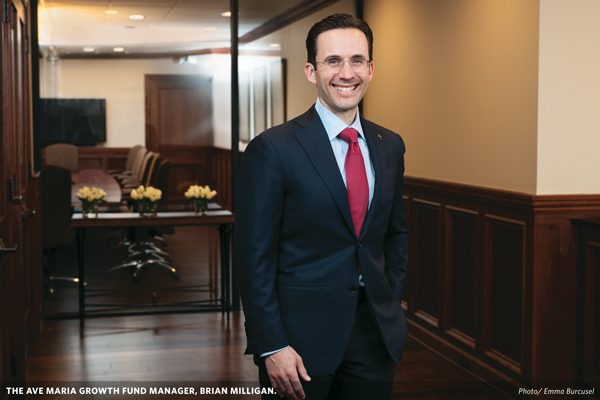Today’s politics tend to evoke strong reactions from people, both positive and negative. The same can be said for the Ave Maria Growth Fund’s strict adherence to the tenets of the Roman Catholic Church, a policy that eliminates companies that are “engaged in activities that are not pro-life or pro-family.”
This “morally responsible investment” mandate eliminates many drug companies, hospitals and health insurance companies because of their involvement with abortion, abortion-related drugs and embryonic stem cell research. It also weeds out some retailers, tech companies, media companies and hotels because they distribute pornography or contribute to Planned Parenthood.
While its religious policies may not appeal to many individuals, the small roster of faith-based mutual funds managed by Schwartz Investment Counsel has gained a loyal following among individuals, church groups, hospitals and other institutions with religious affiliations. The Plymouth, Mich., firm has about $2.5 billion under management, mostly from Catholics and individuals from other denominations with strong religious views.
Brian Milligan, who manages the $695 million Ave Maria Growth fund with co-manager Richard Platte, has done an admirable job of earning shareholder loyalty on the investment end as well. While Milligan hasn’t been the lead manager that long, the returns during his tenure at the helm have been notable.
In 2016, the year he joined Platte as co-manager, the fund’s 12% total return was nearly double that of the average Morningstar mid-cap growth fund. In 2017, when he took over as lead manager, the fund’s 27% return beat its average peer’s by 3.45 percentage points. And last year the fund was down just 1.8%, while the peer group’s return fell an average of 6.65%. Over the longer term, the Ave Maria fund was among the top 17% for performance over five years, and in the top 31% over 10 years.
The fund also tends to lose less than others in the mid-cap growth category when the stock market falls. For example, for the three years ending December 31, the Growth Fund captured 105.7% of the market’s upside and only 86.90% of its downside. The peer category, meanwhile, captured 102.27% of the upside and 123.45% of the downside.
But it hasn’t always been smooth sailing. In 2014 and 2015, the fund’s heavy presence in the industrial sector led to a bout with underperformance against the S&P 500. The fund’s religious screens, which eliminate about 5% of companies in the Russell 3000, also restrict its investment universe to some degree. A number of tech stocks don’t make it through those screens for reasons that are not outwardly obvious. For example, Amazon’s vast retail universe, which allows nudity in its media content, violates the fund’s pornography restriction. Several other notable tech names contribute to Planned Parenthood.
Practicing What He Preaches
Milligan says he doesn’t find the religious restrictions cumbersome, however, and he appreciates the opportunity to work at a place that reflects his core values and beliefs. Religion didn’t dominate the discussion five years ago at his interview for a position as an analyst with the firm, he recalls. Most of the talks centered around investment strategy and philosophy. Still, he was asked if he had problems with the firm’s screening process.
Keeping The Faith
June 3, 2019
« Previous Article
| Next Article »
Login in order to post a comment









